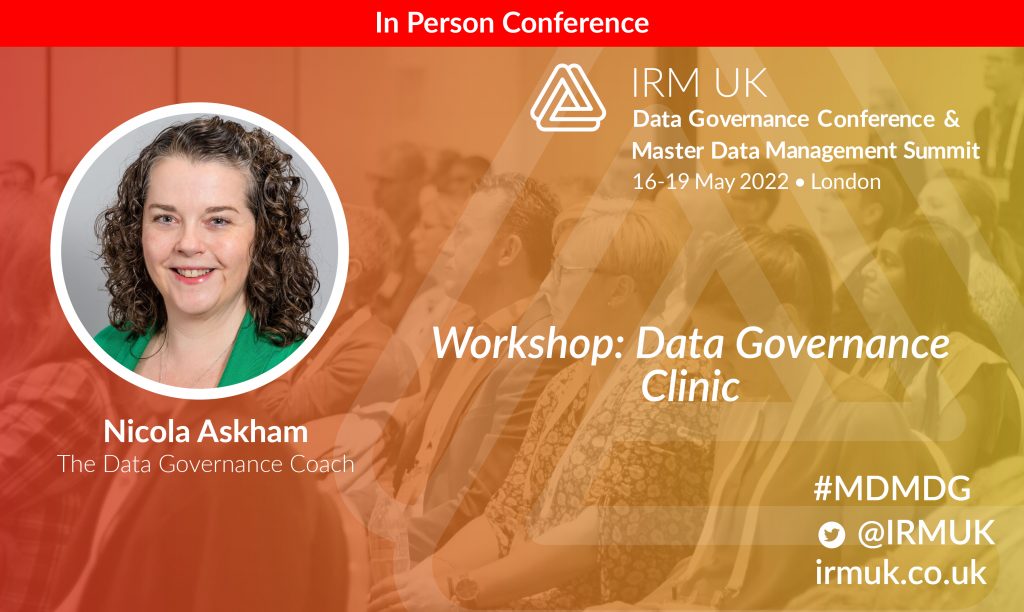

By Nicola Askham, The Data Governance Coach
Data shouldn’t be a wild and untamed thing, but sometimes it is just that – wild… and untamed. And unfortunately for our friend Tim, he’s about to find out just how wild and untamed data can be. As this is ‘The Rocky Data Horror Show’… where the data is not what it seems.
If you missed the previous episodes, you can read them here:
The Rocky Data Horror Show – where the data is not what it seems
The Rocky Horror Data Show: Did you get what you asked for?
The Rocky Horror Data Show: Not everyone’s on board…
Things at the Magical Wish Factory are still tough for Tim. He’s starting to make headway with senior stakeholders and they’re beginning to buy into the data governance initiative. However, progress is still slow because some of the definitions he’s receiving are not up to scratch. In some cases, he’s having to send them back two and three times before they’re suitable enough to be included in the glossary.
Nicola will be speaking at Data Governance Conference Europe and Master Data Management Summit, 16th – 19th May 2022.


So far, he’s had definitions back that use acronyms to explain acronyms and department specific terminologies along with spelling and grammar mistakes galore!
Janet, the Head of IT, is wondering why they can’t just use a list of standard definitions to speed up the process or use the glossary from Tim’s old job.
Tim explains to Janet: This isn’t part of the process that can be skipped over so to speak. Part of the reason for this is that organisations, even those within the same industry, vary rarely use the same terminologies in exactly the same way.
“This means there is no bank of standard definitions to pick and choose from; what works for one organisation will very rarely work for the next”
Tim decides he’s going to send out a list of hints and tips to help people write the best possible definitions.
“But why does it matter so much?” asks Janet.
Tim goes on: “If it is not carefully crafted, the glossary can quickly become an unstructured dumping ground, ironically reflecting the reason the organisation needed one in the first place.”
Tim sends round a memo explaining that a good definition should be unique and distinguishable from other definitions and be written as a descriptive phrase or sentence.
Tim also advises that restating the words of the term in a different order is not sufficient and asks people to avoid using acronyms or other abbreviations as these could cause confusion. His advice is to state what the concept is – not what it is not and to be clear, concise, and unambiguous.
Tim also decides to work with the teams involved in creating the definitions for the most problematic terms.
He works to identify stakeholders who are willing to act as owners of the terms and others who are willing to articulate the term. Tim encourages stakeholders to be rigorous with their definitions and the information they keep on the terms.
Tim explains that a definition can’t just read: ‘Customer Type – the type of customer’. This isn’t a good definition because it tells us nothing about the possible values, who uses the term, why it matters, who wrote the definition, who approved the definition, when it might no longer apply and so on.
Part of this process for Tim is also making sure that both senior and junior people in the Magical Wish Factory have a part to play. Senior people will be accountable for terms and will need to review and approve definitions and junior people tend to be more involved on a day-to-day basis, so they often know more about the issues.
There needs to be collaboration between the two to set up through the glossary in which the junior people begin articulating terms and the senior people review and approve.
Tim is hopeful that with this advice and by working with stakeholders on the most problematic terms that the Magical Wish Factory will be well on its way to creating an excellent glossary…
Stay tuned for episode five of The Data Governance Coach’s new series ‘The Rocky Horror Data Show’ and follow the adventures of Tim and Janet as they try to implement a successful data governance initiative at the Magical Wish Factory.

